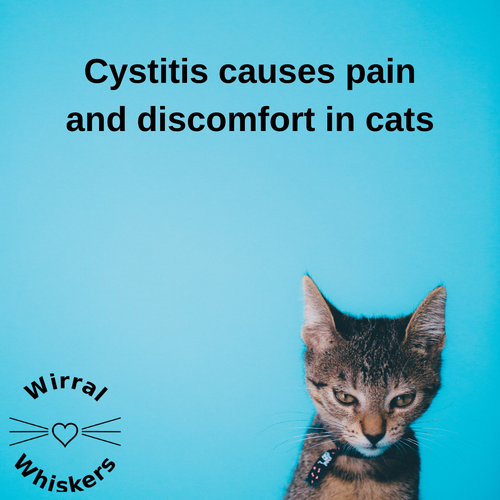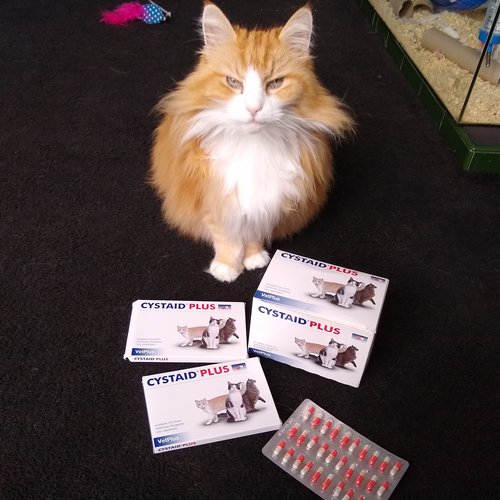Cystitis in Cats
Until my cat experienced cystitis, I hadn't heard of it before. Since then, I've heard it is a common problem in cats. This article will list the warning signs and how you can treat it. There will be some preventative tips as well.
First of all, I would like to say if your pet is showing signs of any illness, please take it to a vet. This article is aimed at giving more information to pet owners so they can be aware of the signs of cystitis and the methods that MAY prevent it from occurring again.

Cystitis in Cats
What it is
Cystitis is known as a Feline Lower Urinary Tract Disease (FLUTD). The term FLUTD is often used for urinary issues that affect the bladder and urinary tract. Cystitis is when the mucus layer that lines the wall of the bladder is inflamed. The inflammation causes deterioration of the layer so bits come away from the bladder wall and expelled in the urine. This causes pain and discomfort which means the pets wee more, which in turn causes more damage to the bladder wall increasing the problem.
Cystitis may occur more often:
- In some breeds.
- If the pet is stressed.
- In overweight pets.
- In pets with other urinary issues such as bladder stones.
- In older pets.
Symptoms and Signs
- Restlessness and wandering around.
- Being agitated.
- Vocalising more. (Strange meowing out of character and possibly different tone.)
- Using the litter tray lots or going out to wee more.
- Displaying pain when urinating.
- Urinating in unusual places.
- Urinating small amounts but often.
- Having blood in urine.
- Washing bottom area excessively.
- Bum shuffling across carpets to clean bottom.
Treatment
Vet treatment is required. As soon as possible as it is very painful in cats and can be fatal. Vets may administer pain relief and medication by injection and/or orally.
Preventative Measures
Things owners can do to help
- Ensure cats drink plenty of water. This can be done by switching from dry to wet food. Alternatively, water can be added to the food.
- Reduce stress levels.
- Keep routines the same.
- Introduce changes slowly i.e. different litter or food.
- Keep cats at an optimum weight.
- Ensure cats eat.
- Special diet food is available for cystitis.
- Create interest in the cats life. Introduce toys, interactive activities and play with them.
Supplements that may help
Cystaid is recommended by vets as it works. This supplement helps to replace the 'glycosaminoglycan layer' in the bladder. This is a mucus layer on the bladder wall.
Cystaid is a capsule that is to be given with food. The best thing is, the capsule can be sprinkled on the food AND my cat doesn't mind eating it. This should be given twice a day at the beginning, and then once a day for maintenance. Cystaid can be purchased online without a vets prescription. I usually shop around as the prices change.
Feliway and Zylkene are products available that may help reduce stress. I have mentioned these in my previous fireworks article. Like Cystaid, these are often recommended by vets and can be bought without a prescription. Prices vary greatly but I have found they are cheaper online.
Feliway is a product that releases pheromones that help cats relax and feel happy. It is available as a diffuser with plug in refills which last about a month, or as a spray which is for specific areas such as travel boxes.
Zylkene is a supplement that contains casein that is said to calm pets. For cats, it comes in a capsule that can be sprinkled on food or dissolved in water. If you are expecting a stressful event, this should be given for a couple of days before.
Ginger's Experience
Ginger was a rescue cat and we got her when she was 10. Not long after she arrived, she had her first bout of cystitis. Vet treatment was the only option for her but they suggested Cystaid. We found that this helped a lot and reduced the instances. We used Cystiad twice a day if she has cystitis but otherwise she is on one a day for maintenance. Feliway was a great help but she no longer needs it. We tried her on Zylkene but found it didn't make a difference.
Her first signal that there may be trouble is going back to the litter box when she has just been in it. She will then want to wee in strange places (and she is always a clean cat using her tray). She will wash her bottom a lot and may even 'bum shuffle' across the floor. With all the washing comes fur ball sick which means she looses fluids. It is like a perpetual spiral downwards with her getting more stressed, anxious and agitated. We do everything we can to prevent it.
We feed Ginger wet food but on one meal a day, extra water is added. It has to be the right amount for her as too much water puts her off her food. She has fresh water twice a day as well. She will take the opportunity to drink out of my cup of water if it is fresh. But then she won't drink from it again.
Occasionally she has flare ups and we take her to the vets straight away. The sooner it is caught, the quicker she recovers. Also, the vets can check on their records for what works best for her from past experience. There is one medicine that is magic and an alternative that doesn't seem to work for her.
We try to keep her stress levels minimal but obviously with fireworks etc this isn't always possible. I wouldn't hesitate to use Feliway. Loud noises causes her distress and our children are mindful of this and are considerate around her.
At worst, she can't have the medicine due to it clashing with something she had at a recent visit for cystitis. We even had to take her to the out of hours vets on a Sunday once! I don't want to repeat that! I want her to be happy and healthy.
I hope this article helps owners to help their cats.

Ginger came to see what I was trying to take a photo of. I couldn't have got her in the photo if I wanted to!